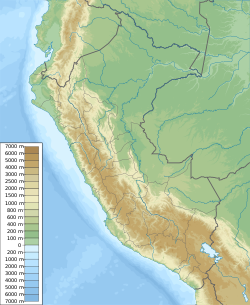Wilcahuaín,[1][2][3] Willcahuaín,[4] or Huilcahuaín[5][6] is an archaeological site in Peru.[4] It is located near the village of Paria, 7 km northwest of the city of Huaraz, Ancash; at an elevation of 3,400 m (11,200 ft).[4]
 | |
| Location | Peru, Ancash Region |
|---|---|
| Region | Andes |
| Coordinates | 9°29′00″S 77°30′40″W / 9.4833°S 77.5112°W |
| History | |
| Founded | 1100 |
| Cultures | Wari |
Wilcahuaín is regarded as one of the most important archaeological sites of the Wari culture.[4] It was possibly built ca. 1100 AD.[2]
The site can be reached by 15-passenger van from the city. Fare is 2.50 Soles. The last half of the route is on very rough road.
Etymology
editWilcahuaín possibly comes from Quechua willka grandchild; great-grandson; minor god; holy; sacred or Anadenanthera colubrina (a tree),[7][8][9] and Ancash Quechua wayi house.[10]
Wikimedia Commons has media related to Willcawain.
References
edit- ^ Falconer, Kieran; Quek, Lynette; Nevins, Debbie (2016). Peru: Third Edition. Cavendish Square Publishing, LLC. p. 136. ISBN 9781502618443.
- ^ a b Schlecht, Neil E. (2008-07-28). Frommer's Peru. John Wiley & Sons. p. 417.
- ^ Legault, Alain (1999). Peru. Ulysses Travel Guides. p. 224. ISBN 9782894641224.
- ^ a b c d "Complejo Arqueológico Willcahuaín". ficha.sigmincetur.mincetur.gob.pe (in Spanish). MINCETUR. Retrieved 2019-05-23.
- ^ Doig, Federico Kauffmann (1966). Mochica, Nazca, Recuay en la arqueología peruana (in Spanish). Universidad Nacional Mayor de San Marcos. p. 84.
- ^ Duthurburu, José Antonio del Busto (1994). Historia general del Perú: Las culturas preíncas (in Spanish). Editorial Brasa. pp. 39, 162, 283.
- ^ Teofilo Laime Ajacopa, Diccionario Bilingüe Iskay simipi yuyayk'ancha, La Paz, 2007 (Quechua-Spanish dictionary): willka - s. Nieto, ta respecto del abuelo. / s. Dios menor en la teogonia incaica.
- ^ Diccionario Quechua - Español - Quechua, Academía Mayor de la Lengua Quechua, Gobierno Regional Cusco, Cusco 2005 (Quechua-Spanish dictionary): willka - s. Hist. Idolo de este nombre. Icono o imagen que representaba la divinidad tutelar del valle que se extiende desde lo que hoy es La Raya –línea divisoria entre Cusco y Puno– hasta la montaña misma. (J.L.P.) || Apellido de origen inkaico. / s. Biznieto o biznieta. SINÓN: haway. || Linaje. || adj. Sagrado, divino, sacro.
- ^ Mariko Namba Walter, Eva Jane Neumann Fridman, Shamanism: An Encyclopedia of World Beliefs, Practices, and Culture, Vol. 1, p. 439 willka or vilca (Anadenanthera peregrina and Anadenanthera colubrina):
- ^ Robert Beér, Armando Muyolema, Dr. Hernán S. Aguilar, Vocabulario comparativo, quechua ecuatoriano - quechua ancashino - castellano - English, Brighton 2006: Spanish Casa, Kichwa Wasi, Ancash Quechua Wayi, English House
